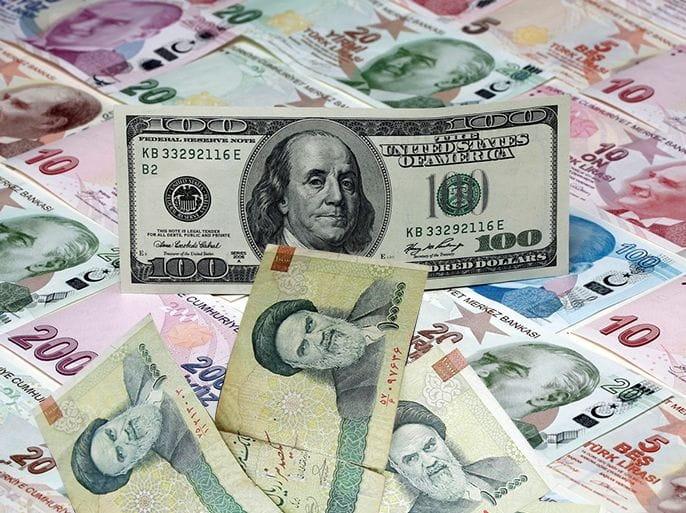
currency rate
Taha Abdul Ghani, General Manager of Namaa Financial Consulting, says that the price of a currency in the markets is determined by supply and demand, just like any commodity in the market.
He adds that there are many factors that control this supply and demand, some of which are related to the performance of the country's real economy and its production and service sectors, while others relate to risky practices such as currency and debt speculation, in addition to political factors.
Transactions with abroad
Taha Abdel Ghani asserts that among the traditional, measurable factors that control currency exchange rates is a country's trade balance.
The stronger exports are compared to imports, the greater the demand for the local currency. Conversely, the more the trade balance tilts in favor of trading partners, the lower the demand for the currency, causing its price to fall against other foreign currencies.
Banking expert Amr El-Sayed also confirms that when a country exports more than it imports, it generates financial returns, which leads to increased demand for its currency and increases its market value.
But when you import more than you export, this leads to a decrease in the trade balance and, in turn, the balance of payments (financial transactions between countries), which then leads to a decrease in the market value of the currency and perhaps to its collapse if the imbalance in this balance worsens.
Jumaa Al-Mu'adhadi says that whenever the trade deficit worsens and the state is unable to address it, the value of the currency will be affected. He justifies this by saying that authorities are forced to increase their reliance on loans, which in turn increases interest rates and, consequently, inflation.
Inflation and interest rates
Taha Abdel Ghani believes that any imbalance in a country's trade balance pushes prices higher domestically due to increased import costs, which impacts the value of the currency.
He points out, however, that the more the state spends on infrastructure, the faster economic growth rates will be, and domestic demand and prices will consequently increase. This will force monetary authorities to increase interest rates to absorb liquidity from the markets and thus drive inflation down to reasonable levels.
For his part, Amr El-Sayed asserts that inflation has a profound impact. The higher it rises, the more traders' appetite shifts toward purchasing foreign currencies at the expense of their local counterparts in order to preserve the value of their holdings.
He says this shift towards foreign currencies as "safe havens" is pushing local currencies down and possibly to collapse.
In this context, Al-Mu'addadi also explains that one of the factors that lead to the collapse of the currency is the imbalance in purchasing power, which means that individuals are turning to foreign currencies in contrast to the decline in demand for the currency.
He asserts that the Qatari currency was subject to speculation at the beginning of the blockade, but Qatar succeeded in countering this pressure thanks to the large cash reserves of its sovereign wealth fund.
Financial analyst Taha Abdul Ghani also confirmed that currency speculation played a major role in the Asian Tigers crisis of the 1990s (the economies of Taiwan, Singapore, Hong Kong, and South Korea, which saw significant growth).
It is believed that these risky operations may have been repeated in Qatar and Turkey at the present time, where banks have entered the fray to finance margin speculation not only in local currencies but also in debt securities.
Political factors
Beyond traditional economic factors and risky financial practices, Taha Abdul Ghani believes that political conditions and investor expectations based on the level of political unrest influence the strength of currencies.
He stresses that investors' expectations regarding the inflow of capital into a country or its future outflow determines the buying and selling of currencies.
Amr El-Sayed also believes that economic wars, sanctions, political disputes, and financial market volatility, as a result, lead to a decline or collapse in the value of currencies.
Turkish President Recep Tayyip Erdogan accuses the West of conspiring against the Turkish currency to harm his economy. He believes it is "not a matter of dollars, euros, or gold, but an economic war against us, and we have taken the necessary measures to confront it."
In the same vein, Iranian Supreme Leader Ali Khamenei declared that his country was facing an "economic war" from its enemies, a reference to the United States, which imposed sanctions on Iran over its nuclear program. The Sudanese pound fell again against the US dollar on the parallel market in the Sudanese capital, Khartoum, amid increased demand for foreign currency from importers and traders.
Central Bank of Iran: A conspiracy brought the rial to record lows.
The Iranian currency, the rial, fell to record lows at the start of trading on Monday, reaching 113,000 rials to the dollar on the parallel market.
Learn about the Turkish Central Bank's measures to support the lira.
The Turkish Central Bank announced on Monday a set of measures aimed at halting the decline of the national currency, which has fallen to record lows of more than seven liras to the dollar.
